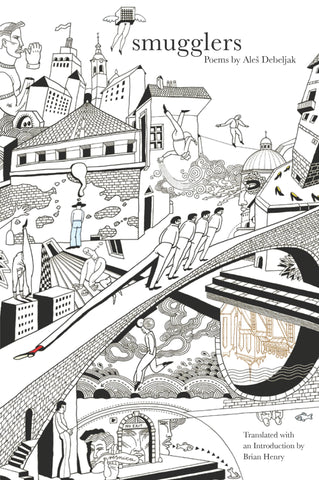
About This Title
Bilingual Edition | Translated from the Slovenian by Brian Henry
The poems in Smugglers move through rapid historical shifts and meditations on personal experience, exploring the depths and limits of comprehension through the people and geography of the Balkans. Ultimately, Aleš Debeljak’s urban imagination creates a mosaic—intimate and historical—of a vanished people and their country. Every poem in Smugglers is sixteen lines long—four quatrains, a common form for Debeljak. This structural regularity is reinforced by a commitment to visual balance, with each poem working as a kind of grid into which the poet pours memories and associative riffs.
“Paperboy”
I climbed through the window of southern light,
which some saw in the dark, and walked to the city
I knew well. My pockets were heavy and wet snow
fell: piles of newspaper were waiting for me.
An urgent matter: whoever loves risks many forms
of amazement. Leaves rustle, headlines
and popular commentaries in the upper left corner
burn. Accounts of arguments swarm between four walls
and the ceiling, between the sky and pleading looks.
They flow into reports on hunger and the crime page,
obituaries for messengers of fantasy and chapters
on the language of wild flowers, perhaps
lavender, definitely not tulips. I walk barefoot
in the foreign winter, nothing really helps, I abuse
many readers and misprints, replacing
news with flat rocks from the island of Pag.
Praise for Smugglers
“Aleš Debeljak’s Smugglers is the type of poetry book that, once the reader establishes a relationship with it, is difficult to lend out or give away. I suggest this because not every book of poems is immediately understood, not every book is instantly appreciated. But Smugglers has a quiet, dazzling nature to it that I find palpable. And so a reluctance to share it is an act to protect its artistry, as if to say, ‘You may read it if only you promise to attempt feeling what I feel.’ A selfish notion, sure, but this is one of those books that came along (for me) when needed. I recommend Smugglers without question. I just can’t quite let you see my copy.”—Damon Marbut, The Rumpus
“...This is perhaps one of Debeljak’s most intimate and exciting collections. The picturesque architecture of Ljubljana evokes the timeless beauty of baroque art and the poet’s attachment to it. At the same time, in the dark deserted interiors reside the ghosts of the past, a past that is unfortunately more powerful than the future.”—Bojana Stojanović Pantović
“Aleš Debeljak is sensitive to the enormity and complexity of our historical and intellectual predicament.”—Charles Simic
“In Smugglers, Aleš Debeljak feeds himself and his readers with a delicious mixture of past, present and future, with tastes of reminiscence and expectations of the world’s new savors.”—Jenko Prize
“[Debeljak] belongs to the group of prominent intellectuals and writers whose poetry—as well as critical, theoretical, and philosophical practice—marked the former Yugoslav cultural and literary space. The author is internationally renowned as one of the major poets of central Europe.”—World Literature Today
Publication Date: June 9, 2015
ISBN: 978-1-938160-67-7
© BOA Editions, Ltd. 2015

